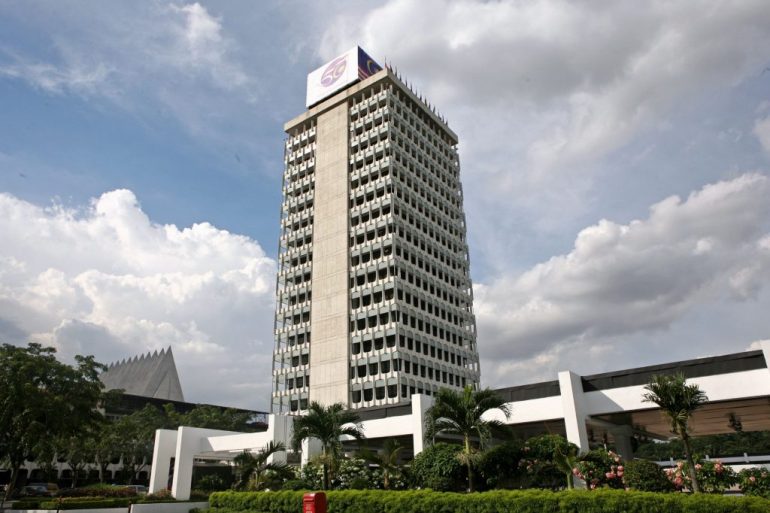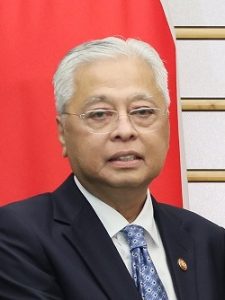What happens when there is a ‘hung parliament’?
If no party, or coalition, has the minimum number of 112 MPs, then the King is required, by legal convention, to invite the leader of the coalition with the largest bloc of MPs, to form a Government.
[1]. When does a ‘hung Parliament’ occur?
A ‘hung’ parliament occurs when there is no single party [or a coalition] that has more than the simple majority of MPs in the House of Representatives.
In Malaysia, the Dewan Rakyat is the House of Representatives. It has 222 seats.
One-half of that number, plus one, equals 112 MPs.
A simple majority, now, would be 112 MPs.
At the end of the 15th General Elections, on 19 November 2022, there were only four major coalitions with a substantial number of MPs.
Pakatan Harapan and its allies (DAP, which contested under its own logo, and MUDA) had 82 MPs.
Perikatan Nasional had 73 (this includes 22 seats contested under the PAS logo).
Barisan Nasional had 30 MPs.
The East Malaysian parties of GPS and GRS together have 29 MPs.
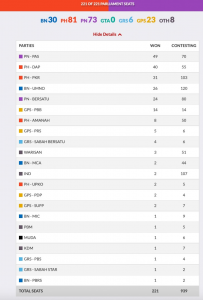
Pakatan Harapan, led by Anwar Ibrahim, with 82 MPs, is short of 30 MPs, which will assist him to form the government.
The leadership of BN (with 30 MPs) has indicated that it will not unite with any other party to form a government – for the moment.
BN MPs say that they have ‘left it to the King’.
So also GPS and GRS (23 + 6 = 29 MPs).
PH cannot attain the majority number of 112 without a ‘supply agreement’ with either BN or GPS and GRS, combined.
Both BN and GPS have openly refrained from any such unifying exercise.
So, not a single coalition had the requisite simple majority of 112 MPs.
[2]. The Federal Constitution has a two-step formula for government formation
First, the King has to appoint a prime minister.
Second, the PM will then nominate several MPs, or members of the Senate into the Cabinet.
[3]. The mechanism for the appointment of a PM
Note that Article 40(2) of the Federal Constitution states that the King,
‘… may act in his discretion’… in the … appointment of a Prime Minister’.
This ‘royal discretion’ is not absolute: it is modified by Article 43, which imposes a ‘mandatory’ arithmetic mechanism.
Article 43(2) of the Constitution states:-
‘[The] Cabinet shall be appointed as follows, … (a). the [King] shall first appoint as … [Prime Minister] to preside over the Cabinet a member of the [Dewan Rakyat] who in his judgement is likely to command the confidence of the majority of the members of that House…’
[4]. The constitutional mechanism for Cabinet formation
After his appointment, the PM then nominates members of the Cabinet.
Article 43(2)(b) provides the mechanism. It reads:
‘[the King] shall on the advice of the Prime Minister appoint other [ministers] from among the members of either House of Parliament’.
[5]. What does the Constitution say about a hung parliament?
It is silent on how a PM is to be appointed when there is a hung Parliament.
Where a written constitution is silent, one must consider if the law provides an alternative legal mechanism.
[6]. Westminster ‘bicameral’ system
Malaysia is a member of the British Commonwealth. We, therefore, follow the UK’s ‘bicameral’ system.
‘Bicameral’ means ‘two houses’, namely: Dewan Rakyat, and Dewan Negara.
[7]. Effect of Legal Conventions
In the Westminster system, when the number of MPs in the highest bloc falls below the required majority, constitutional conventions come into play.
Constitutional conventions are unwritten rules, established by long practice. These rules guide the conduct of politicians and the monarch. Dicey and Mill argued conventions are ‘positive political morality’ which ensures that the electorate’s will is respected. In the Commonwealth, most governmental functions are guided more by convention rather than any written rule.
A convention is not a law passed by Parliament. To that extent, it is not ‘written law’. Nevertheless, legal conventions have long been accepted. They have withstood decades of consistent practice.
[8]. Are UK conventions accepted in Malaysia?
Several leading cases have ruled that British constitutional conventions are accepted and applied all over the Commonwealth.
In Malaysia, e.g. in the case of Dato Zamri Abdul Kadir v. Dato IR Nizar Jamaluddin [2009] 5 CLJ 265, the Court of Appeal accepted the existence of conventions ‘derived from English conventional practice’.1 Federal Court in Abdul Ghani Ali & Ors v. PP & Another Appeal [2001] 3 CLJ 769 citing the Indian case of Madan Murari v. Choudhuri Charan Singh (AIR) [1980] Calcutta 95
[9]. Thus, by convention, when there is a hung parliament, the King is bound to invite the leader of the largest bloc of MPs to form the government
One constitutional convention, which is supported by many years of history, and consistent practice and custom, is one requiring the King to invite the leader of the party (or coalition) with the largest block of MPs – despite it falling below the simple majority – to form a government, pending the convening of Parliament.
[10]. Examples of a monarch (or President) inviting the leader of a major bloc of MPs, without a majority, to form a government
United Kingdom
The United Kingdom’s House of Commons has 650 seats. A bare majority requires 326 MPs. Since the 20th century, UK itself has had several hung parliaments and minority governments.
For example, after the 10 May 2010 UK elections, there was a hung parliament. The Conservative Party emerged as a major bloc with 306 seats. Labour trailed with 258 seats. The Conservatives were short of 20 MPs.
Within 24 hours, on 11 May 2010, the then monarch, Queen Elizabeth II, acting under established convention, invited David Cameron, then the leader of the Conservatives, to form a government. 2 https://www.theguardian.com/politics/2010/may/11/david-cameron-uk-prime-minister
The Queen did not descend into the fray to negotiate with – or to offer advice to – the political parties.
Cameron negotiated with the leaders of the Liberal Democrats. The Libdems had 57 seats. The Conservatives formed an alliance with the Libdems. The coalition agreement set out, and embarked upon ‘a reform agenda’ across a broad range of policy areas including electoral and parliamentary reform. 3United Kingdom Government, The Coalition: our programme for government, Cabinet Office, London, 2010, viewed 20 December 2010, http://www.cabinetoffice.gov.uk/sites/default/files/resources/coalition_programme_for_government.pdf
India
India too has had its fair share of hung parliaments. The House of Representatives, the Lok Sabha, has a total of 545 seats. A simple majority required 273 MPs. From 1977 to 2009, on eight occasions, no single party had a clear majority. For example, after the 07 May 1996 general election, BJP which the largest bloc of MPs, could muster only 161 seats. BJP was short of 112 seats.
Yet on 15 May 1996 President President Shankar Dayal Sharma then invited BJP’s leader, Vajpayee to form a government. The PResident gave Vajpyee until 31 May to form a government, or resign. 4https://apnews.com/article/597ff9a63940eb2b45b753c40f4e457a
After 13 days in office, Vajpayee failed to muster a governing majority. He resigned. He was succeeded by H. D. Dewe Gowda.
[11]. Why ‘pending the convening of Parliament’?
After Parliament is dissolved, and after elections, it must be summoned to meet at least 120 days from its dissolution: Article 55(4) of the Constitution
Parliament was dissolved on 10 October 2022.
Therefore, the 120th day from the date of parliament’s dissolution falls on 7 February 2023.
[12]. What happens when Parliament reconvenes on or before 7 February 2023?
On or before 7 February 2023 Parliament has to be reconvened.
[13]. Acid Test when Parliament reconvenes
On that day, the leader of the highest bloc of MPs must face the acid test.
If, on or before that fateful day the prime minister fails to obtain the support of at least 112 MPs, he has to resign: see Article 43(4).
Art. 43(4)reads:
‘[If] the Prime Minister ceases to command the confidence of the majority of the members of the [Dewan Rakyat], then, unless at his request the [King] dissolves parliament, the Prime Minister shall tender the resignation of the Cabinet.’
That includes the prime minister himself, because he is the leader of the Cabinet, for the PM is MP who ‘presides’ the Cabinet under Art. 43 (2)(b).
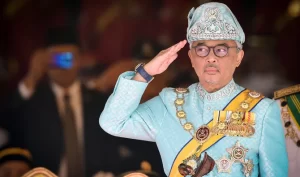
[14]. Conclusion: What must the King do?
So the right thing for the King to do would be to invite the leader of Pakatan Harapan to form a government.
Then when Parliament convenes, the prime minister will know whether his government can survive the full onslaught of the opposition.
[15]. Three further points:
Three points need some answers. These are questions raised by readers.
Pt-1: ‘Is there such a thing as an ‘Interim’ prime minister?’
Some local dailies seem to use the phrase ‘interim Prime Minister’ to denote the leader of the highest bloc. This is incorrect. There is no such definition in the Federal Constitution. Either a person is appointed as a prime minister, or he is not.
Pt-2: ‘Why is the winning bloc being treated like a loser, just like the last time?’
We have heard this complaint repeatedly on social media.
GE15 saw a total turnout of only 73.89% out of 21.17 million voters. That was 15.64 million voters. Of that, over 5.52 million ballots, or 37.5%, were cast for Pakatan Harapan.
The complaint is that those who did worse than PH, (PN, BN and GPS) should not ‘wrest’, the leading bloc’s legal right to form a government.
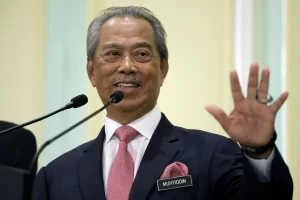
First, the appointment of the prime minister is a numerical issue.
Only when the numerical issue falls below the required majority, is the King required, by convention, to call upon the leader of the highest bloc to form a government.
Second, without 112 MPs in Parliament, it would be impossible to pass laws or to have the budget approved.
If Parliament does not approve a government’s budget, then, by convention, that government must resign – immediately.
Pt-3: That ‘anti-hopping laws ‘hinder’ government formation’
A recent debate speaks of how anti-hopping laws prevent the appointment of the prime ministerial candidate.
This debate is, with respect, misconceived.
With or without the anti-hopping law, there are recognised constitutional conventions that are able to guide the monarch on how His Majesty should appoint the prime minister.
Therefore, the anti-party hopping laws, although helpful, are not essential for the appointment of a prime minister.
I hope you found this explanation to be of some use!
[The author wishes to express his gratitude to KN Geetha, JD Prabhkirat, GS Saran, RJ Nevina and JG Gomez.]

